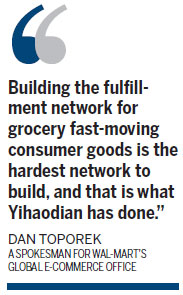Wal-Mart seeks China growth
Updated: 2014-09-04 12:04
By Jack Freifelder in New York(China Daily USA)
|
||||||||
Wal-Mart Stores Inc, the world's largest retail outlet, is looking to increase its presence in China's growing e-commerce market by focusing more attention on its relationship with expanding online grocery store Yihaodian (YHD), the outlet has said.
Wal-Mart initially invested in YHD in 2011 and increased its stake to more than 51 percent in October 2012.
"Building the fulfillment network for fast-moving consumer goods is the hardest network to build, and that is what Yihaodian has done," Dan Toporek, a spokesman for Wal-Mart's global e-commerce office, told China Daily.
"Yihaodian is now building on top of and expanding that network, and expanding the items customers can purchase through it," Toporek added.
YHD has chosen to augment its position as an online grocery shopping market with a number of items, including appliances and clothing.
Kelland Willis, a global e-commerce analyst with Forrester Research, a US-based research and advisory firm, said the move into consumer products could hold some potential hurdles for YHD.
"It's a completely different model for produce: more distribution centers, a more accurate inventory system, etc," Willis said. "Compare that to the tech industry, where if you're a multi-brand retailer you know your margins are bigger because the sale cycle is longer."

That said, the ability to drive volume is there if YHD and Wal-Mart can "drive consumer adoption", she said.
"Western businesses that have done well online in China thus far have been those that have partnered with existing local digital players," Willis said in an interview with China Daily. "Wal-Mart realized that partnering with an existing business that already has significant traffic - which can be expensive to acquire - will be very important to their strategy and YHD serves a massive area."
“Growth rates are extremely high and Chinese consumers have embraced digital trends quite quickly, which shows the sheer power this market has,” she said. “All of this makes for a perfect storm in e-commerce market growth [in China]."
Yu Gang, YHD's co-founder and chairman, said that speed is everything in the Chinese e-commerce market.
"In the United States people accept delivery in five to seven days; in China customers are spoiled," Yu told the Wall Street Journal. "Same-day or next-day delivery is a must. We figured groceries were the hardest to do, and if we could excel there, we could expand quickly into other products."
YHD turns over its entire inventory in just 18 days, Yu added.
YHD, founded in 2008, is an online business-to-consumer (B2C) e-commerce grocery website that provides same-day and second-day delivery services to customers in more than 100 Chinese cities.
Wal-Mart, a multinational retail conglomerate headquartered in Bentonville, Arkansas, runs an international chain of department stores, including Wal-Mart Supercenter and Sam's Club. The company oversees nearly 11,000 stores in 27 countries and manages e-commerce websites in 10 of those markets.
Walmart China, which comprises 400 retail units and more than 100,000 employees, began with the opening of two stores, a Walmart Supercenter and a Sam's Club, in Shenzhen in 1996.
But just like any e-commerce player in China, YHD and Wal-Mart must compete against China's largest e-commerce company, Alibaba Holding Group Ltd, which is expected to bring its IPO in the US in the coming weeks.
Wal-Mart's Toporek said: "We now have more than 2,000 people in Silicon Valley building technologies in e-commerce and mobile. Walmart's expertise in global supply chains is world class and [YHD] is leveraging Walmart's supply chain within China, which enables faster, lower cost delivery."
jackfreifelder@chinadailyusa.com

 Snoopy celebrates 65th anniversary in Shanghai
Snoopy celebrates 65th anniversary in Shanghai
 Shanghai Library joins global database
Shanghai Library joins global database
 Lives risked daily in the shadow of active volcanoes
Lives risked daily in the shadow of active volcanoes
 History hailed
History hailed
 Chinese TV dating comes to Houston
Chinese TV dating comes to Houston
 China-made electric cars heading to US
China-made electric cars heading to US
 Three Gorges Dam discharges flood water
Three Gorges Dam discharges flood water
 Moon Festival not just for Chinese
Moon Festival not just for Chinese
Most Viewed
Editor's Picks

|

|

|

|

|

|
Today's Top News
Wal-Mart to build shopping center in China
US to pave way for Obama's visit
Wal-Mart seeks China growth
Firms fret over monopoly probes
Chinese TV dating comes to Houston
Joint forces to curb illegal abortions
Can HK afford a credit rating cut?
Hotline to help out Chinese overseas
US Weekly

|

|








